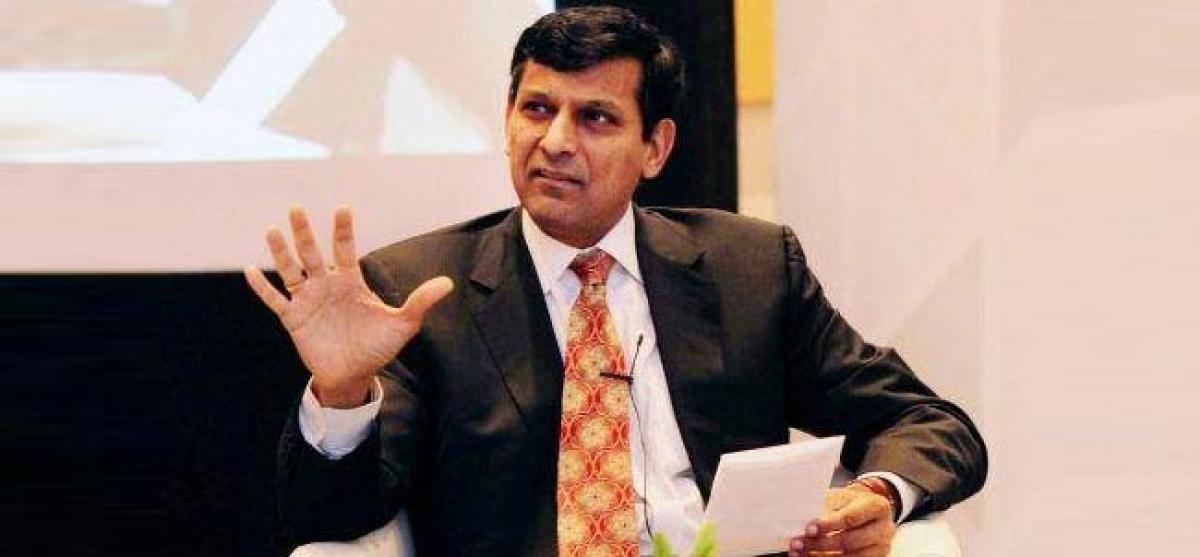Live
- 11 lakh BPL cards revoked, claims K’taka BJP
- Exit polls results indicated victory of the NDA government in Maharashtra and Jharkhand!
- Deputy CM Bhatti Vikramarka Reviews SC/ST Development Funds Implementation
- AP cabinet approves key decisions, check here
- Maharashtra records 58.22 pc turnout, Independent candidate dies of heart attack in Beed
- Manipur: Mobile internet suspension extended for 3 days in 7 districts, curfew relaxed in 4 districts
- EPFO adds 18.8 lakh members in September as employment rises
- ‘Criticise me, not Rabindranath Tagore’, says Assam CM on renaming Karimganj
- Bihar govt launches Ayushman Vandan Scheme
- Infighting again erupts in Trinamool on chair of West Bengal Medical Council
Just In

The Reserve Bank of India isn\'t \"overly perturbed\" by payments bank licences being surrendered, but believes it as a reflection of companies not doing proper assessment while applying.
The Reserve Bank of India isn't "overly perturbed" by payments bank licences being surrendered, but believes it as a reflection of companies not doing proper assessment while applying.
"Don't just go for a licence because it is a valuable property to have," said RBI governor Raghuram Rajan. "Instead, do the due diligence, and when you apply for one, it should be with the intent to carry out operations."
Tech Mahindra, Cholamandalam Finance of the Murugappa Group and Dilip Shantilal Shanghvi of Sun Pharmaceuticals have abandoned their plans to set up payments banks after winning a licence. "We are not overly perturbed that some people have decided that they would not go forward," said Rajan.
"This suggests licensing has been adequately liberal and that we have a variety of players coming in. We presumed they also analysed potential business prospects. Now, after doing further analysis, some of them have decided to back out." RBI will have to find some way to make people find adequate time to do the due diligence on whether they should apply for a licence or not, the governor said.
The central bank in August last year had given an in-principle approval to 11 applicants to set up payments banks. Rajan said RBI awarded the licences to companies it thought had the appropriate qualification to run a payments bank. "My sense is the payments bank works particularly well for those who already have a base of operations and many contact points," he said.
"They can build up on that. The classic example is someone affiliated to a mobile company with many kiosks through which you can do a cash-and-carry."
Many of those who have been in the business but were ignored for a licence blame the central bank for considering only deep-pocketed firms to push its financial agenda, rather than those with capabilities in the area. "The regulator picked up the wrong companies," said Ketan Doshi, managing director of PayPoint India, a domestic remittance company whose application for a payments bank licence was rejected.
"Net worth seems to have become the driving force. We had created touch points, remittances and could have added more portfolios in credit and insurance. They only went for money, it seems our skill sets were not recognised."
"This is a business with profit margin of 0.5% to 1%," said Pramod Saxena, founder of Oxigen, a payments company that didn't get a licence. "These telcos are used to working with 20% margins. They have no idea how to run financial services."
RBI's eagerness to push through on-tap banking licences for universal banks may have also triggered these exits. In the new set of guidelines, the regulator has diluted some norms that had in the past prevented deep-pocketed industrial houses from owning a large stake in banks.
Companies like Bajaj Finserv, Mahindra and Mahindra Financial Services, Tata Capital and Indiabulls Housing Finance may now apply for a private bank licence.
source: techgig.com

© 2024 Hyderabad Media House Limited/The Hans India. All rights reserved. Powered by hocalwire.com







